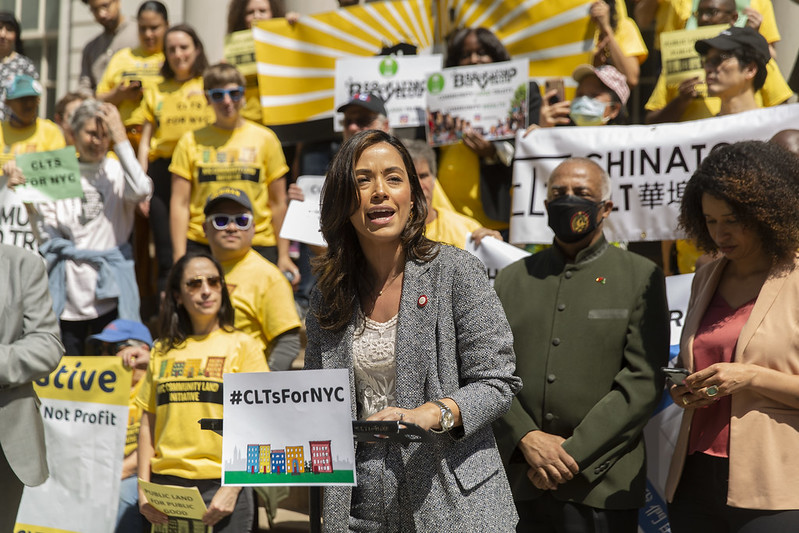
Council Member Rivera, one of the co-authors, at a CLT rally (photo: John McCarten/NYC Council)
In the midst of a persistent housing crisis, there are tens of thousands of rent-stabilized apartment units sitting vacant across New York City, as speculators and unscrupulous landlords contribute to scarcity and a lack of affordability.
In March 2021, The Real Deal reported that landlords had removed over 1,800 apartment listings in Manhattan alone, a number three times higher than in February 2020, and that they were leaving them empty in response to the 2019 Housing Stability and Tenant Protection Act passed in Albany, which was intended to strengthen tenant protections and make the housing market more fair. At a time when 50% of New Yorkers do not earn enough to meet their basic needs, and when about 30% of families are spending more than half of their income on rent, we have an obligation to ensure every habitable housing unit is online. New Yorkers don’t need more luxury development -- we need affordable housing and spaces that meet the needs of our communities.
Nonprofits and Community Land Trusts (CLTs) provide an alternative for housing development that puts community needs first by prioritizing people over profits. The Community Land Act (CLA) is an urgently-needed City Council bill package that would increase opportunities for CLTs and nonprofits to acquire land, remove housing from the speculative market, build new deeply and permanently affordable housing, and enhance public input on public space.
One fundamental pillar of the legislative package is the Community Opportunity to Purchase Act (COPA). For decades, landlords and private equity have leveraged their market power to buy rent-stabilized buildings, seeking to deregulate units, and ultimately gaining profits as working class New Yorkers feel cornered financially dealing with increasing prices and reduced availability. COPA seeks to increase the stock and would require that qualified and eligible nonprofits are notified of sales and provided with the opportunity to submit the first offer matching any competing offers for the property.
This legislation has been implemented in other localities to discourage displacement of legacy residents and to strengthen tenants’ bargaining power. Given the demand on land and housing in New York City, we ought to be intentional in stewarding development in a way that meets the needs of our communities for generations.
CLTs like the Bronx CLT, founded by NWBCCC, have a long history of amplifying tenant associations’ power to take over buildings when landlords sell and are a critical leader in the fight for permanent affordable developments. When the Council helped secure a new Council Initiative to fund organizing for CLTs building on the work of community-based organizations in El Barrio, Port Morris, East New York, and Cooper Square, the $850,000 went directly toward community organizing in order to maintain, develop, and incubate CLTs throughout the city, resulting in an expansion of affordable properties. Even more groups are poised to benefit from COPA when it passes — right now, East New York CLT and Brooklyn Level Up are
working with tenants to negotiate acquisitions of their buildings.
Another critical piece of legislation in the package is the bill to mandate Public Land for Public Good. It will finally ensure that in the city dispossession process related to public land, CLTs and nonprofit developers are prioritized over for-profit developers. New York City nonprofits and CLTs have a proven track record of reaching deeper and longer-term affordability levels, and add additional benefits like community control, permanent affordability, and long-term stewardship.
Our communities have reaped the benefits that result when public land is developed by organizations with deep ties to the community.
In Council Member Rivera’s district, the Cooper Square CLT, which took on an urban renewal plan pushed by Robert Moses at its inception, is the oldest active CLT in New York City, with a portfolio of over 22 affordable buildings. They are core to the work of protecting and empowering tenants on the East Side of Manhattan.
At the Broadway Triangle in Council Member Restler’s district in North Brooklyn, land was transferred to Unified Neighborhood Partners, made up of local nonprofits St. Nicks Alliance, Riseboro, Los Sures, UJO, and Mega Contracting. That development will result in 390 units of permanently affordable housing, and permits the development of landscaped open space, a workforce development center, a shared community center space, and a coffee shop with youth employment programming.
Too often public land is sold to for-profit developers for unimaginably low costs, resulting in rental rates that lead to displacement and financial stress. These projects aren’t solving our housing crisis -- they’re often adding to it -- and New York City should not be in the business of selling public land at steeply discounted costs to for-profit developers when we know that CLTs will bring meaningful, much needed affordable housing to our neighborhoods.
We must pass the Community Land Act to ensure we are giving these organizations every possible opportunity to build more housing and address NYC’s worsening affordability crisis.
***
City Council Members Carlina Rivera and Lincoln Restler represent parts of Manhattan and Brooklyn, respectively. On Twitter @CarlinaRivera & @LincolnRestler.
***
Have an op-ed idea or submission for Gotham Gazette? Email This email address is being protected from spambots. You need JavaScript enabled to view it.




